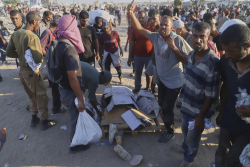Last week, a well-known Egyptian restaurant chain released a promotional image featuring koshary, the country’s national dish, arranged to look like a missile. The hearty street food made from rice, pasta, lentils, chickpeas, and tomato sauce, is not exactly sculptural. But the image, seemingly AI-generated, began circulating on the sixth day of Israel’s Operation Rising Lion—and was widely interpreted as a nod of support for Iran. Tehran’s state-affiliated media celebrated it, even falsely claiming that Israel had threatened the restaurant after it began serving meals styled after Iranian rockets.
In Egypt itself, the missile-shaped dish drew little criticism. Instead, it fit comfortably into the dominant narrative being peddled across Egyptian media, painting Iran as the region’s new resistance hero and Israel as weak and unraveling. However, after the image began to draw criticism in Israel, which has been at peace with Egypt for more than four decades, the restaurant quietly took it down and issued a statement claiming the ad had nothing to do with “politics.” The restaurant is a frequent destination for foreign dignitaries and appears well connected to the political establishment—raising the possibility that the removal came at the government’s request.
In today’s Egypt, one can cheer for Tel Aviv’s destruction on national television, but an image of an AI-generated koshary missile might stray too far from the official script. Once a strategic tool, the regime’s narrative has grown so muddled that few seem sure what still counts as acceptable dissent, or acceptable conformity. The incident highlights a growing contradiction at the heart of Egyptian policy—and an increasingly unsustainable dissonance between the government’s geopolitical interests and the populist narratives it tolerates, and even orchestrates, at home.
What appears at first glance to be a silly marketing stunt reflects a small crack in the careful political balancing act built by Egyptian regimes. For decades, Cairo has borrowed the populist language of President Gamal Abdel Nasser, who positioned Egypt as the leader of the Arab resistance to Israel, while maintaining the pragmatic peace-building approach of President Anwar Sadat, who signed Egypt’s historic peace treaty with Israel in 1979. The result is a system that rails against Israel in the public square, even as it preserves strategic coordination behind closed doors.
This dual-track approach once helped the regime satisfy popular sentiment without jeopardizing its peace treaty with Israel or its standing with Western partners. But the anti-Israeli messaging surrounding Operation Rising Lion, and the Egyptian public’s enthusiastic embrace of it, suggests that the regime of President Abdel Fattah El Sisi may no longer be able to walk that tightrope.
Egypt’s state-controlled media—which is nearly all media in the country—quickly turned Israel’s targeted strikes on Iranian military infrastructure into a domestic propaganda campaign. On Sada El-Balad, a network closely aligned with the Egyptian state, host Ahmed Mousa and his guests focused on what they claimed to see as the weakness of the Israeli home front. “The important part here is that if this scenario continues, with these images, Israel will not withstand a war for a week [or] 10 days,” said Tarek Fahmy, an expert in national security studies, on June 15. He added, “Israel doesn’t have the strategic depth when extended to Iran.”
Fellow guest Abdel Moneim Said, a prominent regime-aligned commentator, declared that Iran had inflicted “shock and disaster” on Israel. Tehran, he said, “is prepared.”
A similar narrative played out on Al Hekaya, or The Story, hosted by longtime Egyptian media fixture and supporter of the Sisi government Amr Adeeb. “The Iranian retaliation has begun,” Adeeb asserted on June 13. “A painful, fiery, and disturbing night for all of Israel’s residents. All the people who were skeptical if there would be an Iranian retaliation, the Iranian retaliation is now live on the air.”
Meanwhile, Al Ahram, Egypt’s flagship state newspaper, focused heavily on alleged Iranian successes while virtually ignoring Israel’s direct strikes on IRGC targets.
This celebration and exaggeration of Iran’s military operations is jarring, and not least because Egypt has historically viewed Iran as a destabilizing regional force. Cairo severed diplomatic ties with Tehran following the 1979 revolution and has never restored them. In the decades since, Egypt has opposed Iran’s nuclear program, aligned with its Gulf rivals, and backed those against Iran in nearly every regional conflict, from Syria to Yemen. Egypt has also suffered direct economic fallout from Iranian proxy activity—particularly Houthi attacks in the Red Sea, which cost Egypt an estimated $7 billion in revenue in 2024 alone.
Recent diplomatic gestures, including a June 1 meeting between Egyptian and Iranian foreign ministers, have done little to change the underlying mistrust. Despite these fundamental tensions, however, Cairo is allowing the elevation of Iran as a heroic actor in its public discourse. The populist urge to score rhetorical points against Israel has overpowered the regime’s ability to speak clearly about its own national interests.
There are rare exceptions to this line of discourse, but they remain rare exceptions. Ibrahim Issa, one of Egypt’s most independent-minded commentators, has warned against falling into Tehran’s orbit. He has also broken with public sentiment by consistently criticizing Hamas and condemned its October 7, 2023, attack on Israel. Issa’s approach suggests an alternative discourse that moves beyond reflexive Israel-bashing without excusing or aligning with its enemies. But in Egypt’s tightly controlled and emotionally charged media space, such nuance is hard to find.
The danger now is not simply propaganda, but the confusion that comes with it. When Egypt’s media praises a country that threatens its economy, undermines its security, and holds opposing regional aims, the contradiction becomes impossible to ignore. What was once a carefully managed strategy of dual messaging under previous regimes now borders on total incoherence.
Worse, still, is when the confusion spills off the screen and into policy. In blurring the line between symbolic resistance and strategic alignment, Egypt risks muddying its foreign policy posture at a time of regional volatility. If the public comes to believe that Cairo truly supports Tehran, it could undercut Egypt’s diplomatic credibility, strain its partnerships, and embolden actors who do not share its core interests.
In a region where perception is power, Egypt’s blurred messaging is no longer strategic. It is a liability.
About the Author: Mariam Wahba
Mariam Wahba is a research analyst at the Foundation for Defense of Democracies. Follow her on X @themariamwahba.
Image: Shutterstock / 360b.

















